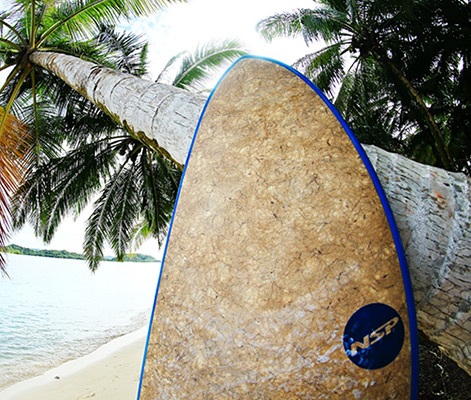NSP CocoMat - SUSTAINABLE SURFBOARD TECHNOLOGY
1st October 2020
The NSP CocoMat surfboard, with its innovative and sustainable COBRA material technology, is a green product success story that developed out of COBRA and Porcher Industries’ 2009 JEC Innovations Award-winning project to develop a better surfboard with lower environmental impact.
Porcher Industries’ GREENLITE® cellulose fiber reinforcements matched the performance of traditional glass fiber fabrics as well as being fully bio-degradable and compatible with other bio-based resins, but in 2010, the COBRA team began to search for a locally available bio-fiber that offered the same benefits but with a significantly lower carbon footprint. Fortunately, an ideal solution was available just around the corner.
COBRA’s facility is in a prime industrial area east of Bangkok, but one does not have to travel far to reach the beautiful green countryside of Thailand, and it was here that the CocoMat story started. Pierre Olivier Schnerb, COBRA’s CTO, was out mountain biking when he saw piles of discarded coconut husk fibers at a local farm. Gathering a small sample Olivier took the materials back to the factory for COBRA’s Head of Innovation, Paolo Cecchetti, to evaluate.
Initial testing looked very promising, with Paolo’s team able to confirm that coconut fiber test panels showed good mechanical properties, impact strength and toughness, as well as meeting production targets for resin absorption and compatibility with epoxy resins. Seeing real potential in the new fiber, COBRA partnered with NSP Surfboards and the first CocoMat board was laminated and sent for on-the-water testing. Unanimously well reviewed by the testers, who loved the light weight and responsive flex of the new boards, it was now time to productionize the CocoMat technology.
Consistent material supply and quality was one of the biggest challenges at the beginning of the project. Often considering the coconut husks as a waste material, the local farmers were certainly not set up to provide a textile material ready for processing. COBRA therefore developed a process internally to clean and separate the raw husk fibers ready for lamination. Well proven board production techniques were modified, with the new fibers used as a randomly distributed 120-140gsm coco fiber sandwich shell around the moulded EPS foam core, before vacuum moulding with epoxy resins.
First generation NSP CocoMat boards showed a unique natural fiber look, used raw non-pigmented fibers, with COBRA and NSP later developing water-based dyes for a coloured CocoMat effect beneath the clear fluid performance skin.
The CocoMat boards’ natural coconut fibers are a breakthrough raw material, but COBRA was determined to do more than just add a “green” fiber to its material sourcing list. In 2017, NSP and COBRA announced a partnership with Harmless Harvest, a “Fair For Life” certified producer of organic coconut water drinks, providing a sustainable source for coconut fibers as well as investing in the local Thai organic farms and communities where their coconuts are grown.
CocoMat has been a massive success with more than 15,000 boards produced to date but this success is about more than the boards’ impressive bio credentials. The coconut fiber massively improves the boards, producing a product which is lighter, stronger, more resistant to impact, and one that riders love to surf!






